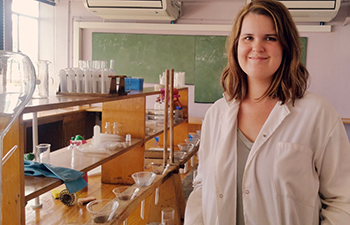Latest News Archive
Please select Category, Year, and then Month to display items
09 December 2020
|
Story Carli Kleynhans
|
Photo Supplied
 Carli Kleynhans.
Carli Kleynhans.
With the most gruelling year recorded in our entire lives, gradually coming to an end we remain hopeful and thankful that we have made it through. From the unexpected shock of going into lockdown, to the worry of having to use a blended approach to succeed in your academics and now finally settling into a new normal, we at the advising office bestow upon you the title of Kovsie champion…because that's exactly what you are!
One of our many champions, Carli Kleynhans, a 3rd (final) year student enrolled for BA Psychology and English shares how she survived…no, actually how she has thrived in 2020.
• What was your biggest concern about your academics when you found out the country was going into lockdown?
My biggest concern about my academics as a final year student was whether the online learning and tests would provide the same in depth learning experiences that are necessary to build upon for future studies.
• What are some of the challenges you've experienced along the way?
Staying focused and trying not to procrastinate was a big challenge I had to conquer, especially trying to not be distracted by my family and my phone. How I survived and was able to thrive in 2020!
• What are some of the strategies you've used to ensure your academics don’t suffer?
Time management was one of the most important strategies that I applied. For most of my classes, I was able to focus each week on a different module, by working and studying in advance I was able to keep up with my workload and still have the weekends to focus on myself, therefore creating designated time to work, study and also time to relax and read.
• What support have you received from the institution that's helped you thus far?
Most of my lecturers have provided needed support regarding our academics. The institution helped provide clarity with everything that was going on.
• What do you think the UFS could have done differently to support student success?
I think the UFS could have provided more resources for the final year students, especially considering we have to apply for further studies; online it was difficult to discern exactly what was necessary for the applications, whereas in class I feel more information would have been provided.
• What has kept you motivated?
Knowing it is my final year has helped to motivate me, as I have to use these grades to apply for further studies. I recently received recognition from Golden Key and this helped to further inspire me to work even harder at my academics.
• What advice do you have for your fellow Kovsies who are finding it difficult to keep going?
Remember to make time for yourself, to look after yourself and your mental health, especially in these difficult times. Work in advance and keep to your personal academic calendar.
Postgraduate student to conduct research on maize quality at Michigan State University
2017-03-27

Schae-Lee Olckers, master’s student in the
Department of Microbial Biochemical and
Food Biotechnology.
Photo: Supplied
Schae-Lee Olckers, a master’s student in the Department of Microbial Biochemical and Food Biotechnology at the University of the Free State (UFS), will be travelling to the US in a few weeks’ time. For the next two years she will be doing research at the Michigan State University (MSU) at its Department of Food Science, working on wheat quality and its baking properties.
Increase the nutritional value of maize
The title of her master’s research project is: “The influence of low and optimal nitrogen conditions on the nutritional value of quality protein maize”. She is focusing on the influence of environmental conditions on the nutritional value of maize.
New hybrids of maize production developed
Olckers said: “I chose to start my research on this specific topic in my honours year because maize is the main staple crop in South Africa, as well as in the rest of Africa. Therefore, micronutrient malnutrition is a major concern for developing countries as well as for poor people who rely on it as a major food source. I found it interesting that these breeding programmes that are being developed for new hybrids of maize for production are focusing on increasing the nutritional value of maize and can therefore help eliminate micronutrient malnutrition in some populations of poor communities,” she said.
Prof Perry Ng will be her research supervisor. He is an affiliated professor at UFS in the division of Plant Breeding. “I am very excited about the opportunity to travel and to gain experience working with a well-known cereal scientist. The work he does is also closely associated with my research,” said Olckers.
Her supervisors at UFS are Profs Garry Osthoff and Maryke Labuschagne from the Departments of Microbial Biochemical and Food Biotechnology and Plant Sciences respectively.